Therefore, experts recommend that there should be a roadmap.
According to the Ministry of Education and Training (MOET), in the new context, education on artificial intelligence (AI) plays an important role in helping students acquire and expand their knowledge, be creative in the digital environment and adapt to modern society. AI also supports the formation of the ability to apply technology in study and work.
Pilot from December 2025
The Ministry of Education and Training is seeking comments on the draft Guidelines for piloting AI education content in general schools. According to the draft, from December 2025, the Ministry of Education and Training plans to pilot the integration of AI into the general education program from grades 1 to 12.
The AI education content framework is built on four knowledge streams, corresponding to four competency domains: Human-centered thinking, AI ethics, AI techniques and applications, and AI system design. These knowledge streams complement each other, helping students understand the boundary between the use of technology and social responsibility, ensuring that AI serves humans safely and humanely.
The content framework is divided into 2 stages: Basic education (primary, secondary) and career orientation (high school), designed to be interconnected but differentiated according to age characteristics. At primary level (familiarization), students recognize AI through visual applications (image recognition, voice), understand that AI is created by humans and initially form awareness of protecting personal data.
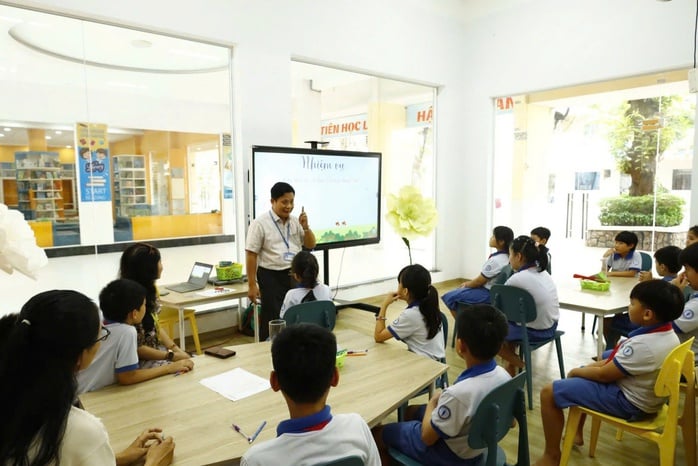
Students of Tran Hung Dao Primary School (Cau Ong Lanh Ward, Ho Chi Minh City) are excited in lessons applying AI and integrating STEM into lessons. Photo: DANG TRINH
At secondary school level (basic understanding), students understand the operating principles (data, algorithms), practice using AI tools to solve learning problems and identify risks and biases of AI.
By the time they reach high school (career design and orientation), students can design simple AI systems, develop complex problem-solving thinking, and orient themselves toward careers in the technology field.
Schools can proactively choose the implementation method, such as integrating into subjects, organizing seminars, projects, clubs, etc., suitable to practical conditions.
The Ministry of Education and Training also requires localities to maximize available resources and facilities, avoid scattered and ineffective investments; encourage cooperation and socialization to mobilize resources to support expertise, learning materials and practical experiences. Localities need to have appropriate solutions so that all students, especially those in disadvantaged areas, have the opportunity to access AI education.
It is expected that by December 2025, the Ministry of Education and Training will develop documents and train core staff to implement AI education. From December 2025 to May 2026, a number of educational institutions will conduct the pilot. In June 2026, the Ministry of Education and Training will summarize and evaluate the pilot results, complete the AI content framework to propose widespread implementation in the following school years.
Professor Dr. Le Anh Vinh, Director of the Vietnam Institute of Educational Sciences , said that the institute is piloting the AI program from grades 1 to 12 in experimental schools, with 16 teaching periods per year. The institute has developed an AI program in general education, from which schools can develop regulations for application.
According to Professor Le Anh Vinh, there are currently three viewpoints related to AI education: Integrating AI completely into subjects; viewing AI as a part of computer science and viewing AI as an independent subject. "The viewpoint of the Vietnam Institute of Educational Sciences is to integrate AI into general subjects to avoid overlap," Mr. Vinh emphasized.
Step by step, fundamental and practical
Referring to the experience of implementing AI in schools, Ms. Do Ngoc Chi, Principal of Nguyen Binh Khiem Primary School (Sai Gon Ward, Ho Chi Minh City), said that the school started with fundamental and practical steps. Accordingly, the school built infrastructure, trained teachers, then innovated teaching and learning methods, so that digital transformation could truly reach each class and each student. The school clearly identified the advantages and challenges to synchronously deploy groups of solutions, focusing on core issues.
According to Ms. Do Ngoc Chi, determining that "to transform digitally, one must have a digital foundation", Nguyen Binh Khiem Primary School has planned and invested in synchronous technology infrastructure, aiming for a smart and friendly learning environment. In particular, the focus is the "Digital skill classroom" project with an open - flexible - modern design. The room is equipped with 40 tablets, Smart TV, facial recognition attendance machine, high-speed internet, QR codes for learning about network safety and digital citizenship principles. Here, students learn how to master technology, not be dominated by technology.
The Principal of Nguyen Binh Khiem Primary School informed that the school focuses on training its staff and teachers to transform from awareness to action. 100% of staff and teachers are trained in exploiting digital learning materials and AI tools to support teaching, applying LMS platforms, Microsoft Teams, online classroom management software... Teachers are encouraged to shift from "transferring knowledge" to "leading capacity", taking technology and AI as companions, forming critical thinking, creativity and civilized behavior in cyberspace... Teachers also have to innovate in designing lessons so that students can access AI from grade 1.
In Ho Chi Minh City, Le Hong Phong High School for the Gifted is one of the first educational institutions to organize AI teaching. Principal Pham Thi Be Hien said that the biggest difficulty today is the lack of teachers who are properly trained in AI. This is a problem that needs to be solved soon.
"Currently, Le Hong Phong High School for the Gifted has chosen to contract with university lecturers and AI engineers. We also organize in-depth training for the school's IT teachers," Ms. Pham Thi Be Hien informed.
According to Professor Le Anh Vinh, the results of a survey on AI readiness conducted by the Vietnam Institute of Educational Sciences at the end of 2024 showed that more than 87% of secondary school students have knowledge of AI; 76% of teachers have used AI in teaching. Notably, 30.95% of teachers are uncertain about the effectiveness of using AI; more than 20% are not confident in applying AI in teaching.
Mr. Le Anh Vinh proposed that the implementation of AI in general education should be based on three main pillars: a consistent policy framework - ensuring requirements on ethics, data security and long-term orientation; comprehensive and flexible curriculum and learning materials; human and financial resources. Policies should prioritize the development of an AI competency framework for students and teachers; guidance on the application of AI in teaching and investment in digital infrastructure to narrow regional gaps.
Prof. Dr. Hoang Van Kiem, senior advisor of information technology, Saigon International University:
Deployment in 3 phases
In fact, many countries have implemented AI applications in education, but some have failed due to lack of adequate preparation. A set of textbooks takes 6-7 years to complete, so the introduction of AI into general education in Vietnam requires preparation and testing.
AI education in primary schools can be implemented in 3 stages. Stage 1 is familiarization - discovery (primary school): Students are exposed to AI gently through games, images; fun learning applications with AI elements. The goal is to help them form technological thinking and creative curiosity. Stage 2 is basic understanding - application (secondary school): Students begin to understand the operating principles of AI, learn how to ask questions, analyze simple data and apply AI to learn other subjects. Stage 3 is forming creative thinking - using AI responsibly (high school): Students learn how to cooperate with AI to solve problems, do small research projects, and at the same time practice ethics, responsibility and courage when using technology.
Ms. NGUYEN PHUONG LAN, General Director of EMG Education Group:
Based on 3 pillars
AI has been applied in integrated English programs and testing. Thereby, a closed ecosystem with AI participation is formed, from learning to testing assessment: creating and managing smart test banks, supporting test grading; virtual assistants and virtual teachers supporting test preparation, data analysis...
Promoting AI application needs to be based on three main pillars: English training, digital capacity training and core AI application technologies combined with Metaverse.
Source: https://nld.com.vn/truong-hoc-thu-nghiem-giao-duc-ai-can-co-lo-trinh-196251125213238165.htm








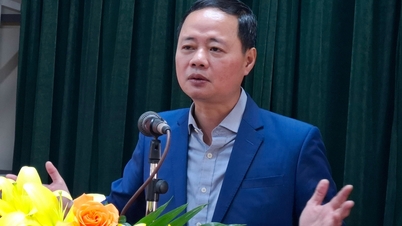






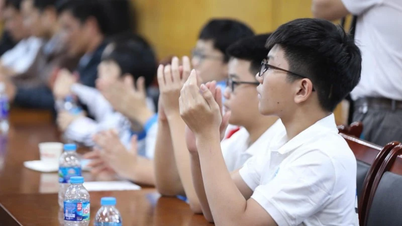











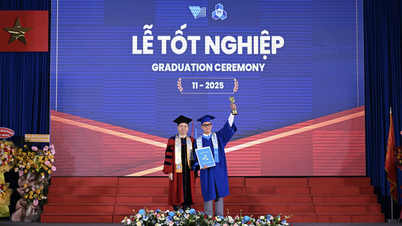



















































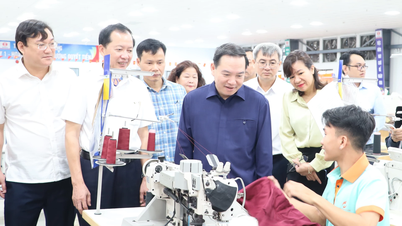


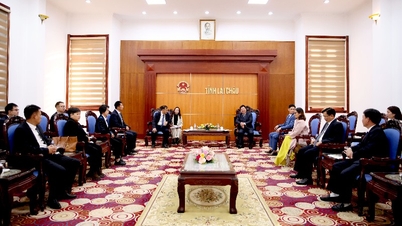

















Comment (0)